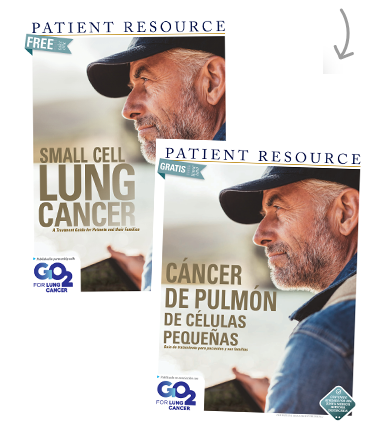
Small Cell Lung Cancer
Clinical trials
Clinical trials may become part of your treatment plan, so it is important to learn about them. These research studies contribute to medical knowledge related to treatment, diagnosis and prevention of diseases or conditions. Ultimately the goal of a clinical trial is to provide you and the entire cancer community longer, healthier lives. Understanding the different types, their potential impact on your treatment plan and the broader benefits of such research can help you decide whether a clinical trial is right for you.
A clinical trial is a research study that investigates new or emerging treatments for a disease and compares these treatments to established protocols to determine their effectiveness, safety or new usage. The results of these studies can make a positive difference in future cancer care in a variety of ways. Currently several treatment strategies for small cell lung cancer (SCLC) are being studied in clinical trials. These include drug therapies in the first- and second-line settings, radiation therapy and combination therapies.
Choosing to participate in a clinical trial may provide you options when your diagnosis has few or no approved therapies or your cancer has become resistant to your current treatment. In addition, you will have the opportunity to be monitored by both the specialists managing your trial and your cancer treatment team. Although most trials involve some risks, they may not be greater than the risks related to standard-of-care treatments or disease progression.
Volunteers of all ages, genders, locations, races and ethnicities, weights, sexual orientations and socioeconomic groups help researchers understand how a variety of people react to certain interventions. This diverse pool of volunteers also helps determine how a strategy works in people who are at higher risk for certain conditions such as heart disease and diabetes.
The Type of Trials
The following types of clinical trials explore treatment and non-treatment strategies.
Therapeutic treatment trials evaluate one or more interventions, such as drug therapies, medical devices and new or revised approaches to surgery or radiation therapy. Recently, a great deal of focus has been on identifying therapies that treat cancers with specific biomarkers. For SCLC, detecting certain biomarkers can indicate whether a cancer will be more receptive to certain therapies, such as immunotherapy. Research is also ongoing to find new treatments for cancers that do not exhibit a biomarker.
Designed to evaluate one or more ways to identify or diagnose a particular disease or condition, disease prevention and patient screening trials also find ways to prevent the initial development or recurrence of a disease or condition. These can include medicines, vaccines or lifestyle changes, among other approaches.
Diagnostic tools and procedures trials are conducted to examine new and improved methods for identifying a condition or the risk factors for that condition.
Researchers use genetic risk factor studies to learn more about the genetic disorders and disease-related mutations that cause various types of cancer.
Lifestyle and behavioral changes trials are designed to explore and measure ways to make people more comfortable as they manage a chronic condition. Some test the effect lifestyle changes have on lowering the risk of cancer and on current cancer treatments. Others incorporate measures to improve quality of life.
Searching for a Clinical Trial
First, consult with your medical team to identify the trials they recommend. After gathering your diagnosis and treatment information, you can search for SCLC trials online or by phone. Further customize your search by including information such as age, desired location or previous treatments.
Once you have found a trial that interests you, call the clinical trial team to gather information. Then, discuss it with your doctor and loved ones.
You may undergo testing to see whether you meet the eligibility requirements. In addition, you must review and sign the Informed Consent form, a safety measure designed to protect participants throughout the clinical trial. The Informed Consent document generally includes the trial’s goals, modality (method of treatment), potential risks and benefits, costs, safeguards, and other information. Keep in mind that even after signing the form and beginning the trial, you may leave the trial at any time and for any reason.
Smoking cessation clinical trials for your loved ones
If your friends or family smoke or use tobacco products, your experience may encourage them to think about stopping. Habits involving nicotine can be hard to break — especially on their own. The most successful approach combines medications, counseling and support, which they may find by participating in a smoking cessation clinical trial.
Along with reducing the risk of lung and other types of cancer, long-term advantages of these potentially lifestyle-changing studies include decreased risk of other conditions related to tobacco use, lowered blood pressure, decreased heart rate and improved sense of smell and taste. Use the resources on this page to learn more about this proactive step toward better health.


